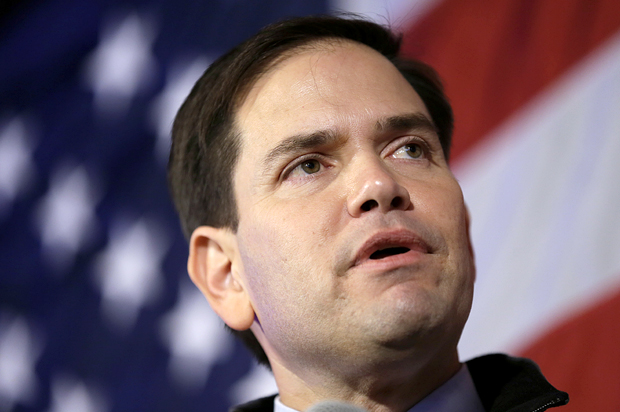I’ve probably written at least one or two of them during my career, but I’m generally not a big fan of the “Moderate Politician X is actually not very moderate!” genre of Op-Eds. My reasons are both stylistic and substantive. It’s hard to do anything interesting on such well-trod ground, and these labels, by their very nature, are relative and in constant flux.
Put differently, the center in 2015 isn’t where it was in 1980. And while politicians have a role in shifting the Overton window in one direction or another, they are mostly reactive creatures. To paraphrase Marx: Politicians can choose which ideological space to occupy within the politics of their era. But the era itself, that’s no more up to them than it is to you or me. (I doubt that, say, Ronald Reagan would support gun control if he were running for office today.)
That said, though, the 2016 presidential campaign has already proven to be special, shall we say, in a few regards. And the one that’s been on my mind lately has to do with this whole idea of what it means to be a moderate. Because while it’s a little cheap — or at least unenlightening — to use the politics of a generation ago to slam a candidate as inconsistent or radical, I think it’s a different thing if the timeframe isn’t measured in decades but rather months and weeks.
Which brings me to Marco Rubio, the junior senator from Florida currently seeking the Republican Party’s presidential nomination. Despite at one point being seen as too right-wing to make it to the Senate (this was before the Tea Party really got going; a simpler, more innocent time) Rubio has been described throughout his presidential campaign as coming from the party’s supposedly reasonable, establishment-friendly wing. He is, we’re told, one of the “adults.”
Back when the campaign was largely concerned with the issue of immigration, and when Donald Trump’s rank demagoguery was the standard against which all the other Republicans were measured, this was a defensible characterization. But now that the campaign has, in the wake of the Paris attacks, become almost exclusively about ISIS and counter-terrorism, Rubio’s moderate label is wholly undeserved. Moderate? He is anything but.
Rubio has always aligned himself with the über-hawkish, neoconservative wing of the GOP when it comes to foreign policy. But while he’s long been almost John McCain-like in his willingness to drop bombs on other people — even once going so far as to chide his fellow Republicans for not wanting to bomb Libya more — it’s only lately that Rubio’s generic militarism, which he happily unsheathed against countries as dissimilar as China and Cuba, has drifted toward outright Islamophobia.
Take his response to Donald Trump’s inflammatory comments about closing down mosques, for example. Whereas Rubio has halfheartedly attempted to steer Republicans away from demonizing Hispanic people, when it comes to Muslims, it appears, his goal is to one-up “the Donald.” Rather than shoot down Trump’s flagrant disregard for the basic small-l liberal principle of religious freedom, Rubio criticized Trump for not going far enough.
“It’s not about closing down mosques,” Rubio told Fox News’ Megyn Kelly on Thursday. “It’s about closing down anyplace — whether it’s a cafe, a diner, an Internet site — anyplace where radicals are being inspired.” The goal shouldn’t be to only shutter houses of worship, Rubio insisted, but “whatever facility is being used … to radicalize and inspire attacks against the United States.”
His complete lack of interest in the First Amendment notwithstanding, some journalists have argued that Rubio wasn’t making such a sweeping threat. Rubio was saying he’d go after radicals, they say, not Muslims! There’s a big difference! And, indeed, there is. But that reassurance would be a whole lot more reassuring if the distinction were one that Rubio, too, believed in. Judging by another recent utterance of his, though, it seems likely that it is not.
Here’s what Rubio said last weekend in response to a question about the phrase “radical Islam,” which most Democrats, for reasons both strategic and moral, try to avoid. The emphasis is mine and [sic] throughout:
I don’t understand it. That would be like saying we weren’t at war with Nazis because we were afraid to offend some Germans who may have been members of the Nazi party, but weren’t violent themselves. We are at war with radical Islam, with an interpretation of Islam by a significant number of people around the world who they believe now justifies them in killing those who don’t agree with their ideology. This is a clash of civilizations.
As Talking Points Memo’s Josh Marshall has noted, this comment has not received nearly the amount of attention that it should. Because while it’s nothing new to hear the violent extremism of ISIS or al Qaeda compared to Nazism, it’s much less common to hear someone of stature imply that all Muslims are morally equivalent to Nazis. Not Germans, mind you, but Nazis — which means, of course, that Islam is equivalent to the Nazi Party.
So in the span of about a month, Rubio has not only vowed to shut down any forum where Muslims congregate that he deems threatening, but also made clear that he sees all Muslims as inherently suspect; as equivalent to perhaps the most destructive, violent and evil organization in human history, in fact. They say Marco Rubio is a moderate. Does that sound to you like moderation?

